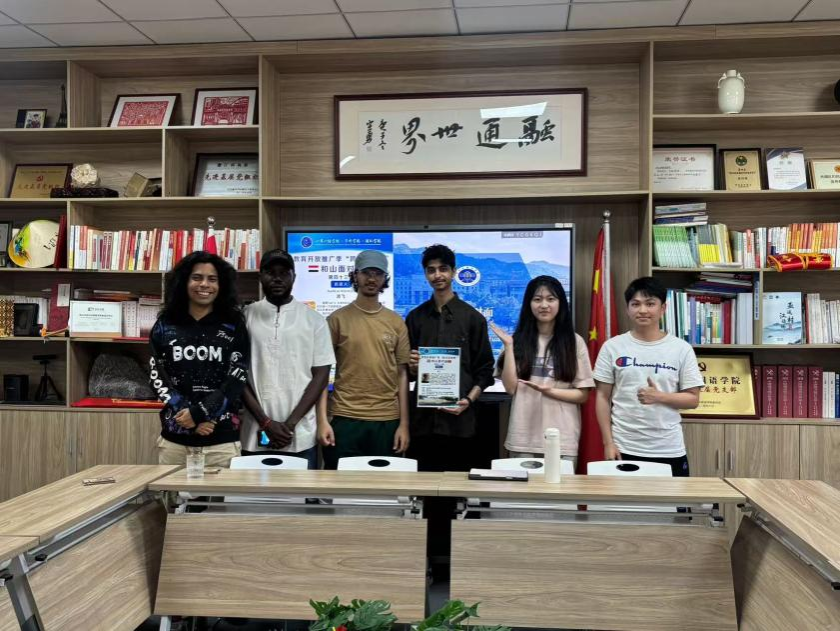教育开放推广季“跨文化视野”
和山面对面 第四十三期
——约访学生涛飞
为了进一步深入了解并关心国际留学生在校期间的学习与生活状况,同时增进中外学生对不同国家文化的认识和理解,致力于培养学生的国际视野,并促进跨文化的交流与文明间的对话,国际学院特别策划了教育开放推广季活动——“跨文化视野”系列之“和山面对面”访谈节目。
本次活动由旅游管理专业暨娅晴主持,特邀来自也门的留学生涛飞(Tawfik)作为嘉宾。涛飞以其深厚的文化底蕴,带领现场师生进行了一场穿越红海的文化之旅。在访谈中,涛飞不仅分享了也门作为咖啡发源地的悠久历史,他讲述的"摩卡港—中国"海上香料之路故事,将六百年前中阿贸易的盛况娓娓道来。涛飞分享了自己在也门的成长经历、对中国的印象以及在两国文化差异中的有趣发现。这次交流无疑加深了参与者对不同文化的理解和欣赏,促进了校园内的文化交流与融合。
涛飞,来自卡门,一名2025级汉语语言文化专业的学生。
Tawfik, from Yemen, is a student majoring in Chinese language and culture in the class of 2025.
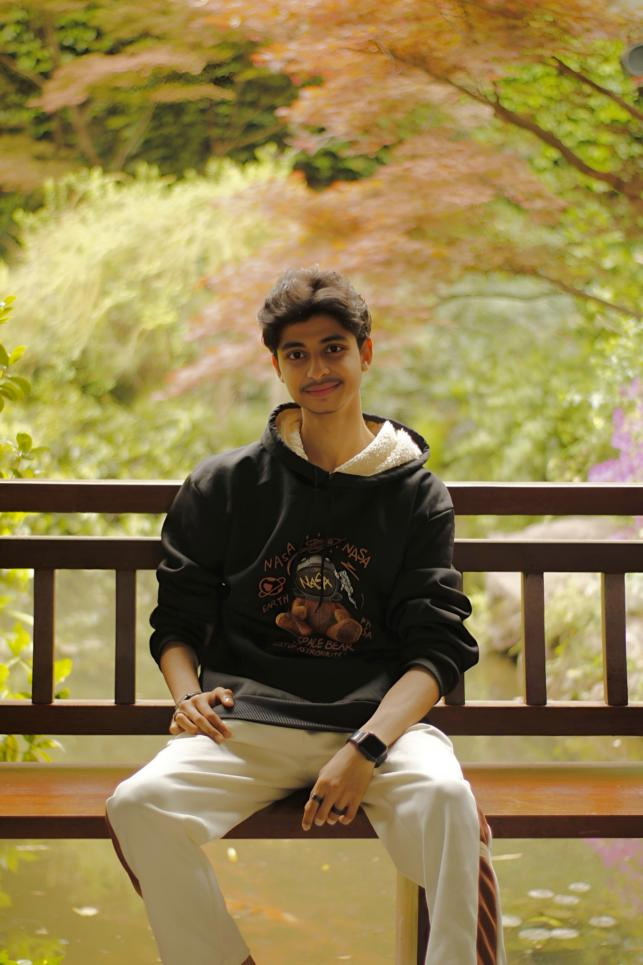
1.暨娅晴:我们开始吧!首先,你提到你的中文名叫“涛飞”。能分享一下这个名字的由来和意义吗?
涛飞:因为我痴迷飞翔——天空、云朵和星辰都让我着迷。同时,“陶”谐音“涛”,寓意海浪。这个名字融合了我对天空与海洋的诗意向往!
暨娅晴:这名字很有中国韵味!你觉得中文名帮你更好地融入这里了吗?
涛飞 :当然!我的阿拉伯名字对中文使用者来说很难发音。但当我自称“陶飞”时,大家会心一笑——这像一座瞬间搭建的桥梁。(笑)还有人亲切地叫我“豆腐”!
1.Ji Yaqing:Let’s begin! First, you mentioned your Chinese name is "Tao Fei." Could you share why you chose it and what it means to you?
Tawfik:I chose it because I adore flying—the sky, clouds, and stars fascinate me. The name also reflects my love for the sea; "Fei" (飞) means "to fly," while "Tao" (涛) evokes waves. It’s a poetic blend of my passions!
Ji Yaqing:It sounds very Chinese! Do you feel having a Chinese name helped you connect with locals?
Tawfic:Absolutely! My Arabic name is tricky for Chinese friends to pronounce. But when I introduce myself as "Tao Fei," their faces light up—it’s like an instant bridge. (Laughs) Some even call me "Tofu" affectionately!
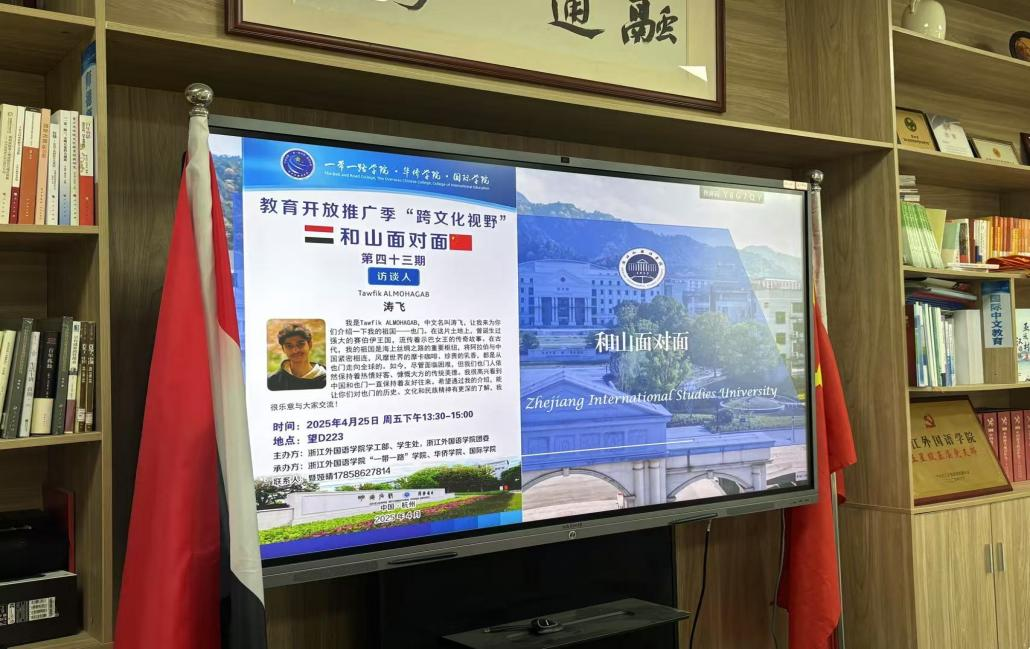
2.暨娅晴:你来中国多久了呀?是什么促使你来到这里?
涛飞:我来中国大约一个半月了。这个决定其实源于童年时一次改变我人生的经历。在也门,有一所由中国政府支持的中也文化学院。有一天,我跟随上课的表哥来到那里。闲逛时,我被一间教室里传出的陌生语言吸引——那是中文课!当时我只懂英语和阿拉伯语,却立刻被迷住了。透过教室门缝,我看到老师在黑板上书写优美的汉字,在年幼的我眼中,那些笔画更像是艺术绘画而非文字。
暨娅晴:那位就是王老师吧?
涛飞:是的,王老师!他注意到我入迷的样子,亲切地邀请我加入课堂。那时我才十岁,但这个瞬间开启了我的中文之旅。
涛飞:课后,王老师教我书写简单汉字,讲述中国文化。最打动我的是他讲的牛郎织女传说——天上的织女爱上人间的牛郎,被天庭阻隔,每年只能在鹊桥相会一次。
他还给我看七夕节的庆祝视频和照片。这个故事成了我的精神坐标,让我今天得以实现童年梦想,来到中国。我永远感激王老师为我打开的这扇神奇之门。
2.Ji Yaqing:How long have you been in China? And what inspired you to come here?
Tawfik:I've been here for about a month and a half now. The inspiration to come to China actually stems from a childhood experience that changed my life.Back in Yemen, we have a China-Yemen Cultural Institute supported by the Chinese government. One day, my cousin took me there when he was attending classes. While wandering around, I heard strange sounds from one classroom - it was a Chinese language class! At that time, I only spoke English and Arabic, but I was immediately drawn to it. When I peeked inside, I saw the teacher writing beautiful characters on the board. To my young eyes, they looked like artistic drawings rather than words.
Ji Yaqing:That was Teacher Wang, right?
Tawfik:Yes, Teacher Wang! He noticed how fascinated I was and kindly invited me to join the class. I was only ten years old then, but that moment marked the beginning of my Chinese journey.After class, Teacher Wang taught me how to write some basic characters and shared insights about Chinese culture. What really captured my heart was the legend he told me - about the Weaver Girl who lived in the sky and fell in love with a cowherd on earth. The gods separated them, only allowing them to meet once a year across the Milky Way.He showed me videos and photos of the Qixi Festival that celebrates this legend. That story became my inspiration - it's why I'm here today, living my childhood dream in China. I'll always be grateful to Teacher Wang for opening this magical world to me.
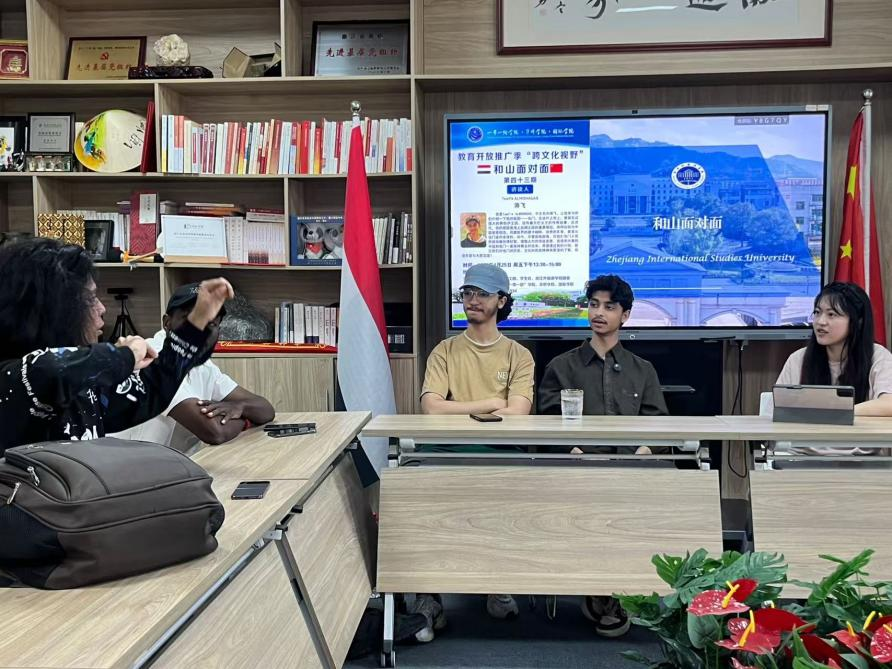
3.暨娅晴:真有意思。能说说你在也门和中国生活感受到的最大文化差异吗?
涛飞:也门和中国的文化差异非常明显。在我的家乡,男女通常在社交和教育场合都是分开的,所以当中国女生第一次直接和我交谈时,我确实很惊讶——虽然需要时间适应,但我很欣赏这种开放。日常生活也大不相同。刚来时我总在地铁里迷路,直到朋友帮我开通支付宝。即便如此,我还是得全程翻译广播才能找到回家的路!如果中国朋友去也门,一定要知道我们非常好客——当地人一定会为客人支付所有开销。只是需要注意,由于传统习俗,男女在公共场合的交往会更保守些,但本质上也门人对所有访客都非常热情友善。
3.Ji Yaqing:That's wonderful. Could you share some of the biggest cultural differences you've noticed between Yemen and China?
Tawfik:The cultural differences between Yemen and China are quite striking. Back home, boys and girls are typically separated in social and educational settings, so I was genuinely surprised when Chinese girls first spoke to me directly - it took some adjustment, though I appreciate this openness. Daily life here is very different too. At first, I constantly got lost in the subway system until friends helped me set up Alipay. Even then, I'd spend entire metro rides translating announcements just to find my way home! If Chinese friends visit Yemen, they should know our people are incredibly hospitable - locals will insist on paying for everything as guests. Just remember that gender interaction is more reserved in public due to our traditions, though Yemenis are fundamentally warm and welcoming to all visitors.
4.暨娅晴:也门曾是古代海上丝绸之路的重要枢纽,你认为这段历史对现代中也关系有什么影响?
涛飞:可能很多人不知道,在也门,我们始终把中国人视为最亲密的朋友——过去是,现在是,将来也是。丝绸之路在我们的文明之间建立了牢不可破的纽带。历史上,在我们的商人使用阿拉伯语之前,甚至用汉字进行贸易记录。几个世纪以来,我们通过这条海上通道交易乳香、没药等珍贵商品。这段共同历史让我们的现代关系就像延续了数百年的友谊一样自然。
Ji Yaqing: As Yemen was a key hub on the ancient Maritime Silk Road, how do you think this historical connection influences modern Yemen-China relations?
Tawfik: Many people don't know this, but in Yemen, we've always considered the Chinese our closest friends - past, present and future. The Silk Road created an unbreakable bond between our civilizations. Historically, our merchants even used Chinese characters in trade records before Arabic became dominant. For centuries, we exchanged frankincense, myrrh and other precious goods through this maritime network. This shared history makes our current relationship feel like a natural continuation of centuries-old friendship.
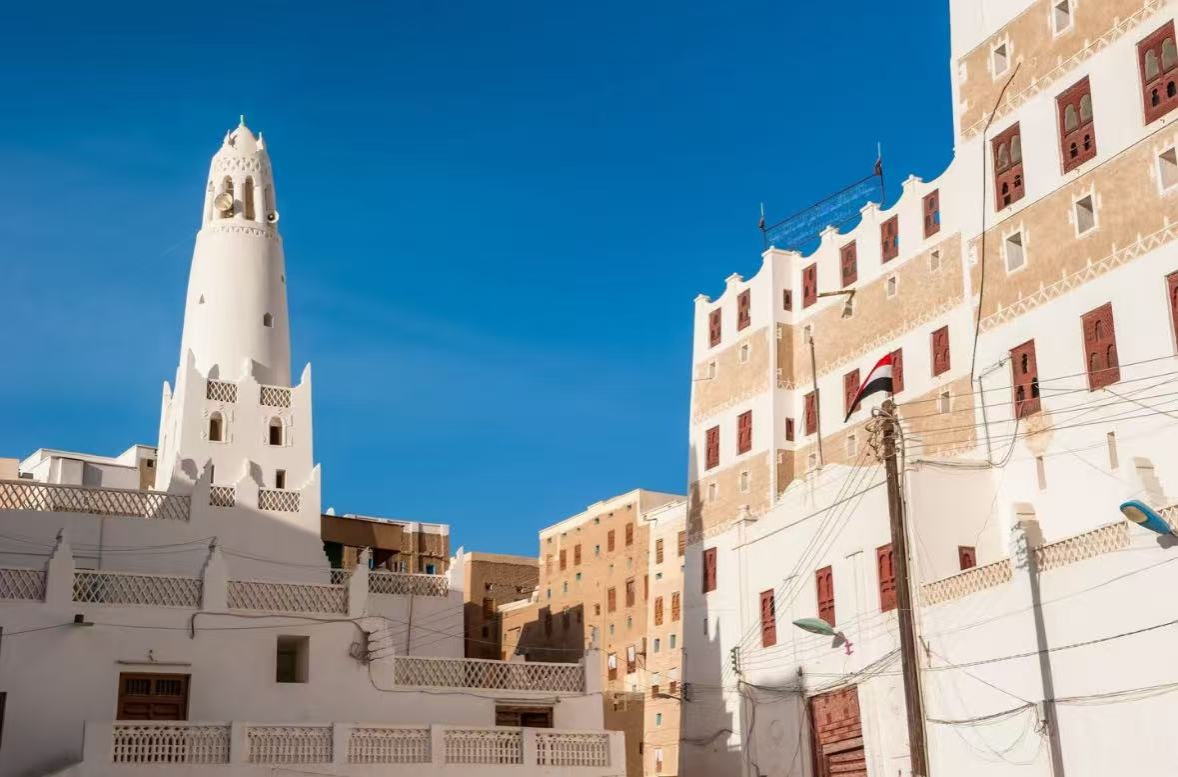
5.暨娅晴:你提到了也门的摩卡咖啡,能多介绍一下吗?
涛飞: 摩卡其实是我的家乡!在阿拉伯语里,我们叫它"Makha"。这里不仅是咖啡的发源地之一,更是世界上最早种植咖啡的地方之一。我母亲总说,也门的咖啡豆是世界上最好的——它们生长在高海拔的山地,阳光充足,风味独特。说实话,虽然这里的咖啡也不错,但总感觉少了点什么……那种浓郁的巧克力香和微微的果酸,是别处很难复制的。我已经让母亲给我寄一些正宗的也门摩卡豆了!虽然价格不菲,毕竟是最顶级的品质,但我很期待能和大家一起分享这份来自家乡的味道。对我来说,咖啡不仅仅是一种饮品,更承载着家的记忆。
其实,也门的美食远不止咖啡。我母亲的厨艺特别棒——有时候想家,最让我怀念的不是风景,而是她做的饭菜香气飘满屋子的感觉。
Ji Yaqing: You mentioned Mocha coffee from Yemen - could you tell us more about it?
Tawfik: Mocha is actually my hometown! In Arabic, we call it "Makha." It’s not only one of the birthplaces of coffee but also among the earliest regions in the world to cultivate coffee beans. My mother always says Yemeni coffee beans are the best—grown in high-altitude mountains, bathed in abundant sunlight, with a uniquely rich flavor. To be honest, while the coffee here is good, it still feels like something’s missing… that deep chocolatey aroma and subtle fruity acidity are hard to replicate elsewhere.I’ve already asked my mother to send me some authentic Yemeni Mocha beans! Though they’re quite expensive due to their premium quality, I’m really looking forward to sharing this taste of home with everyone. To me, coffee isn’t just a drink—it carries the memories of home.Actually, Yemen’s culinary culture goes far beyond coffee. My mother is an amazing cook—sometimes when I miss home, it’s not the scenery I long for the most, but the comforting smell of her dishes filling the house.
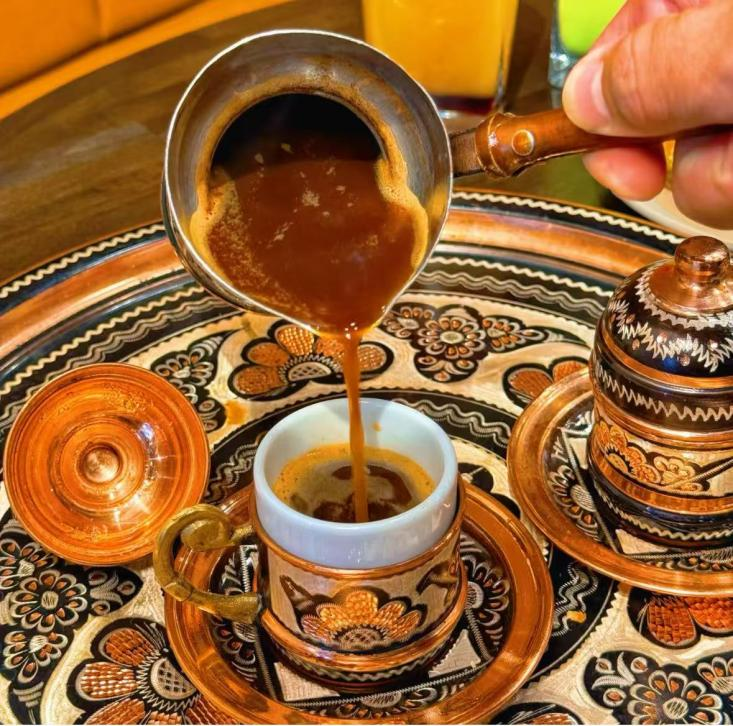
6.暨娅晴:可以介绍一下也门有哪些传统节日,是你希望更多人了解的吗?
涛飞:和所有穆斯林国家一样,也门有两个主要节日。一个是开斋节(Eid al-Fitr),标志着斋月结束;另一个是古尔邦节(Eid al-Adha),即朝觐者从麦加归来时。在这两个节日里,我们会用鲜花和欢乐迎接他们。男性通常会佩戴弯刀(jambiya)作为腰带的一部分,并穿着长袍(thobe)。女性,尤其是农村地区的女性,会穿华丽的裙装,有时搭配面纱。
Ji Yaqing: Could you tell us about some traditional Yemeni festivals that you'd like more people to know about?"
Tawfik: In Yemen, like all Muslim countries, we primarily celebrate two major festivals. The first is Eid al-Fitr, which marks the end of Ramadan, the month of fasting. The second is Eid al-Adha, when pilgrims return from Mecca. During these celebrations, we welcome them back with flowers and joy.Men typically wear a curved dagger as part of their belt, along with a long robe. For women, especially in rural areas, they wear ornate dresses and sometimes face coverings.
7.暨娅晴:您刚才提到示巴女王的故事,大家都很想深入了解。您认为她的统治对也门历史和文化为何如此重要?
涛飞:示巴女王在也门历史上具有传奇地位——她是史料记载中首位统一也门境内外多个民族的女性君主。古老的石刻铭文将她的统治与其他伟大君王共同铭记,确立了其作为也门最具远见领袖的历史地位。她的外交成就与文化影响力,至今仍在也门历史叙事中熠熠生辉。
Ji Yaqing:Since you mentioned the Queen of Sheba earlier, we're all curious to hear more about her legacy. What makes her reign so significant in Yemeni history and culture?
Tawfik:The Queen of Sheba holds a legendary status in Yemeni history as our first recorded queen who united diverse nations both within and beyond Yemen. Ancient stone inscriptions chronicle her reign alongside other great monarchs, solidifying her legacy as Yemen's most visionary leader. Her diplomatic achievements and cultural influence remain unparalleled in our historical narratives.
8.暨娅晴:也门以独特的泥砖摩天楼闻名,能谈谈它们特别之处吗?
涛飞:当然!在也门的哈德拉毛省(Hadhramaut),有座古城希巴姆(Shibam),被称为沙漠中的曼哈顿。这些 500多年历史 的泥砖高楼有的高达 8层,几乎触到云朵!它们是 世界上最早的‘摩天楼’,还被列入联合国教科文组织遗产。最著名的是 岩石宫殿(Dar al-Hajar),建在一块巨石上。建筑采用传统工艺:稻草加固的晒干泥砖,窄楼体设计能抗震。顶楼的景色壮丽——能俯瞰整个山谷!
Ji Yaqing: Yemen is famous for its unique mud-brick skyscrapers. Can you tell us what makes them so special?
Tawfik: Yes! In Hadhramaut (a historic province in Yemen), we have the ancient city of Shibam, often called the Manhattan of the Desert. These towering mud-brick buildings, some over 500 years old, reach up to 8 stories high—almost touching the clouds! They’re considered the world’s earliest 'skyscrapers' and are UNESCO-listed for their unique architecture.The most famous is Dar al-Hajar (Rock Palace), built atop a massive stone. The structures use traditional techniques: sun-dried mud bricks reinforced with straw, and their narrow design helps withstand earthquakes. The views from the top are breathtaking—you can see entire valleys!
